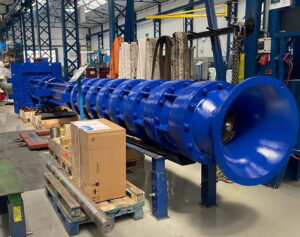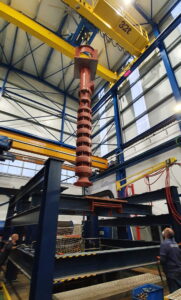Potable water pipelines are a lifeline for people living in arid regions around the world and these rely on pumping stations to ensure access to clean and safe water. At the same time, the remote nature of these pumping stations means that equipment reliability is essential as spare parts may be difficult to source. In some cases, the challenges of importing replacement parts may require any repairs to be made using local resources.
Under these circumstances, a pump design that proves itself with decades of reliable service will be considered an unquestionable success. As such, it is important that any replacement is manufactured to exactly the same specifications, forgoing modern seal materials or bearing designs to meet the local maintenance requirements and parts availability.
For example, in the remote and desolate environment of north-eastern Iraq, the local population relies on a crucial pipeline to deliver potable water to their taps. Built in 1980, the original distribution pipeline was constructed by an Austrian company as part of a larger project that included an intake station and clarifiers. Throughout this project, Sulzer pumps were installed and they have been performing reliably for over 40 years.
Now, the pumps on one section of the pipeline have reached the end of their service lives and are being replaced with new assets with exactly the same design and specification. In addition to the proven durability of the pumps, the customer’s engineering teams will be able to service the equipment with the same resources as previously.
Continued success
During the operational life of these pumps, the maintenance teams have had little or no access to non-local spare parts and they appreciated the robustness of the Sulzer design. In 2009, the regional government completed refurbishment projects of the intake station and the clarifiers, where Sulzer has supplied the new pumps. Based on this successful partnership, the company was invited to tender for the replacement pumps in the pumping station.
Over the years, the local government had experienced a number of reliability issues with pumps that had been supplied by other manufacturers. Combined with their positive experience with the Sulzer products, the decision was made to order three new pumps and a new 11 kV high-voltage motor.

Per the customer’s request, the new motor and 7-stage pumps retained exactly the same design and technology that was used in the components that were installed in 1980. Two of the original motors will continue in service.
Mahmood Al Muhur, working for Sulzer in Iraq, explains: “In most situations like this, the new pumps would be fitted with design improvements, such as Teflon bearings, but in this case the specifications have been kept exactly the same to meet the operator’s requirements. Brass bearings and shaft sealing materials have been retained as per the 1980s specifications.”
Simple installation
 As part of the contract, the customer sent representatives to Sulzer’s manufacturing plant in Spain, where they witnessed the operational testing of the pumps. Once complete, the pumps were shipped to Iraq, where they were installed and commissioned. This process was very straightforward because the dimensions matched those of the legacy pumps and the engineers on site have considerable experience in working with this equipment.
As part of the contract, the customer sent representatives to Sulzer’s manufacturing plant in Spain, where they witnessed the operational testing of the pumps. Once complete, the pumps were shipped to Iraq, where they were installed and commissioned. This process was very straightforward because the dimensions matched those of the legacy pumps and the engineers on site have considerable experience in working with this equipment.
In addition to the new pumps and drive motor, Sulzer also supplied three new couplings and three back-stop bearings as part of the project. Based on four decades of real-world experience, they do not anticipate any other parts requirements for the foreseeable future.
Ruud Sillessen, Sales Director for Middle East at Sulzer, concludes: “A reliable supply of potable water is crucial to this region and Sulzer has ensured that the customer received exactly the specification of pump they required. Having demonstrated such excellent reliability, these pumps have proven they can continue to help deliver water to the local people for many years to come.”












